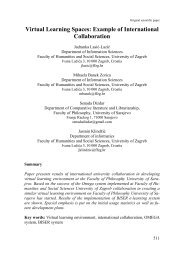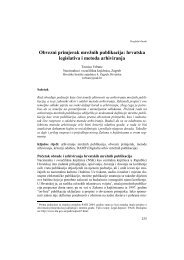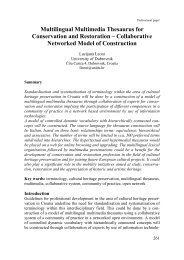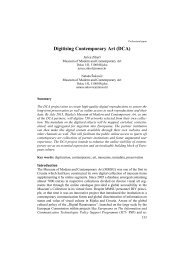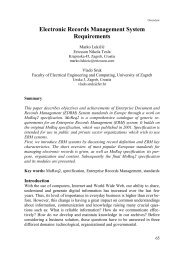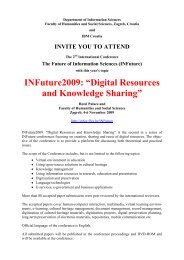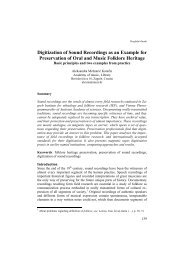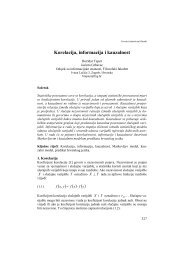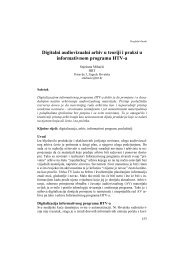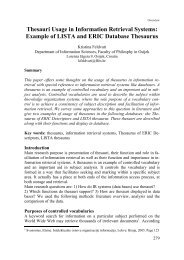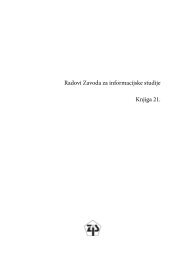Sharing Knowledge and Information: Three Views of the Future
Sharing Knowledge and Information: Three Views of the Future
Sharing Knowledge and Information: Three Views of the Future
Create successful ePaper yourself
Turn your PDF publications into a flip-book with our unique Google optimized e-Paper software.
IN<strong>Future</strong>2009: “Digital Resources <strong>and</strong> <strong>Knowledge</strong> <strong>Sharing</strong>”<br />
remarkable changes in consequence; most particularly as a result <strong>of</strong> <strong>the</strong> move<br />
towards a predominantly digital <strong>and</strong> networked provision <strong>of</strong> information. All<br />
sectors <strong>of</strong> library/information services – including national, public, academic,<br />
industrial/commercial <strong>and</strong> governmental services – have changed greatly in response,<br />
though in different ways according to <strong>the</strong>ir situation.In <strong>the</strong> past two<br />
years, <strong>the</strong>se forces for change have intensified, <strong>and</strong> <strong>the</strong>ir effects – actual <strong>and</strong><br />
potential – on <strong>the</strong> library/information world have been seen more clearly. While<br />
one might point to a very wide range <strong>of</strong> such forces <strong>and</strong> influences, it is possible<br />
to identify a few particularly significant examples, in order to examine <strong>the</strong>ir effects.<br />
The economic situation<br />
The economic downturn worldwide, <strong>and</strong> <strong>the</strong> likelihood that it will last for some<br />
years, with enduring effects <strong>the</strong>reafter, cannot fail to affect all <strong>the</strong> library/information<br />
sectors. We may assume that many <strong>of</strong> <strong>the</strong>se effects, at least<br />
initially, will be negative. In <strong>the</strong> UK, we have seen a local municipality attempting<br />
to close <strong>the</strong> majority <strong>of</strong> its public library branches in response to economic<br />
problems; this provoking appeals to central government to over-rule <strong>the</strong><br />
action. We have similarly seen an immediate decline in information-related jobs<br />
in <strong>the</strong> commercial sector. No doubt such problems will continue, <strong>and</strong> will be<br />
observed worldwide. On <strong>the</strong> more positive side, in <strong>the</strong> UK at least, <strong>the</strong> economic<br />
situation has prompted a ‘back to basics’ mentality. There is some evidence<br />
that this includes a re-found enthusiasm for libraries, for books, for borrowing<br />
ra<strong>the</strong>r than buying, <strong>and</strong> for sharing <strong>and</strong> collaborating. Not least, <strong>the</strong>re is<br />
a renewed emphasis on <strong>the</strong> sharing <strong>of</strong> knowledge <strong>and</strong> expertise. All <strong>of</strong> <strong>the</strong>se<br />
things could, paradoxically perhaps, result in more, ra<strong>the</strong>r than less, support for<br />
libraries <strong>and</strong> o<strong>the</strong>r ‘information institutions’.<br />
Digital world<br />
We have now reached a situation where, in most situations in Europe <strong>and</strong> North<br />
America at least, digital information is <strong>the</strong> norm. Printed materials are ei<strong>the</strong>r byproducts<br />
<strong>of</strong> digital originals, or are ripe for digitisation, as in <strong>the</strong> massive book<br />
digitisation projects being supported by Google, Micros<strong>of</strong>t <strong>and</strong> o<strong>the</strong>rs. Academic<br />
<strong>and</strong> pr<strong>of</strong>essional journals are now invariably wholly or mainly digital in<br />
form, as are almost all business information resources. E-books are only slowly<br />
gaining in popularity, but new developments in e-paper <strong>and</strong> e-readers imply that<br />
a tipping point to wide availability <strong>of</strong> e-books, <strong>and</strong> perhaps also e-newspapers,<br />
may come soon. This has led many commentators to make assumption that all<br />
libraries <strong>and</strong> o<strong>the</strong>r information collections are on a track towards a necessarily<br />
all-digital future. However, one <strong>of</strong> <strong>the</strong> aspects <strong>of</strong> <strong>the</strong> economic downturn noted<br />
above, <strong>and</strong> consequent feelings <strong>of</strong> uncertainty about <strong>the</strong> current <strong>and</strong> future state<br />
<strong>of</strong> society in <strong>the</strong> developed world, has been a renewed enthusiasm for <strong>the</strong> ‘real’.<br />
This has included an enthusiasm for collections <strong>of</strong> real things, including real<br />
6



